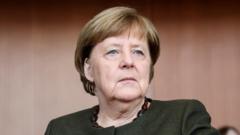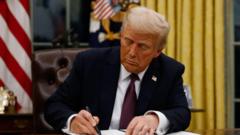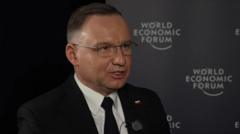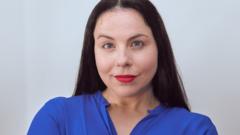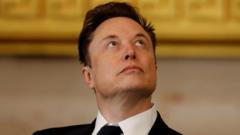The discussion included topics from energy policies to historical references, raising eyebrows and questions about the implications for Germany's political landscape and Musk’s role.
Musk's Controversial Interview with German Far-Right Leader Alice Weidel
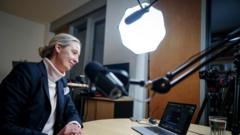
Musk's Controversial Interview with German Far-Right Leader Alice Weidel
In a surprising move, Elon Musk publicly supports Germany's Alternative für Deutschland party through a live chat with its leader, Alice Weidel.
Elon Musk sparked significant controversy this Thursday by hosting a live conversation with Alice Weidel, the frontwoman of Germany's far-right political party, Alternative für Deutschland (AfD). The 74-minute dialogue covered a wide array of topics, including energy policy, the challenges of German bureaucracy, discussions around Adolf Hitler, and even philosophical musings on life and the cosmos.
In the chat, Musk openly urged German voters to support the AfD in the upcoming elections scheduled for February 23, marking a bold move in his engagement with European politics. This interview followed significant criticism directed at Musk for allegedly interfering in the electoral process amid Germany's turbulent political landscape. Conducted in English, the session also served as an opportunity for the AfD to promote its agenda to a global audience via Musk's social media platform, X.
During the conversation, Weidel asserted her party's values, framing them as "conservative" and "libertarian," while rejecting the mainstream media’s portrayal of the party as extremist. However, portions of the AfD have been classified officially as right-wing extremist by German authorities, and prior investigations have uncovered troubling connections between some members and far-right networks.
In a particularly controversial statement, Weidel labeled Hitler a "communist," defying the widely accepted historical narrative of his anti-communist regime. She further described him as being an "antisemitic socialist," provoking strong reactions among historians and political commentators alike.
Despite the controversial topics discussed, there were moments of levity, notably when Musk and Weidel shared a laugh about bureaucratic challenges and Germany's previous abandonment of nuclear energy. During this unusual exchange, Weidel inquired about Musk’s belief in God, to which he responded that he's open to the idea as he explores the complexities of the universe.
Polling currently shows the AfD as the second most popular party in Germany, although political alliances remain strained, making it unlikely for them to gain power. Musk, known for his significant investments in Germany, including a major Tesla facility near Berlin, referred to Weidel as the "leading candidate to run Germany," a statement that could further intensify political discourse surrounding the upcoming elections.
Despite criticisms from various political leaders in Germany, including Chancellor Olaf Scholz, who chose to remain unfazed by Musk's comments, the impact of this interview on the political landscape remains to be seen. As tensions rise and discussions deepen, both Musk's actions and Weidel’s rhetoric continue to evoke strong responses and underline the evolving nature of political engagement in the digital age.








